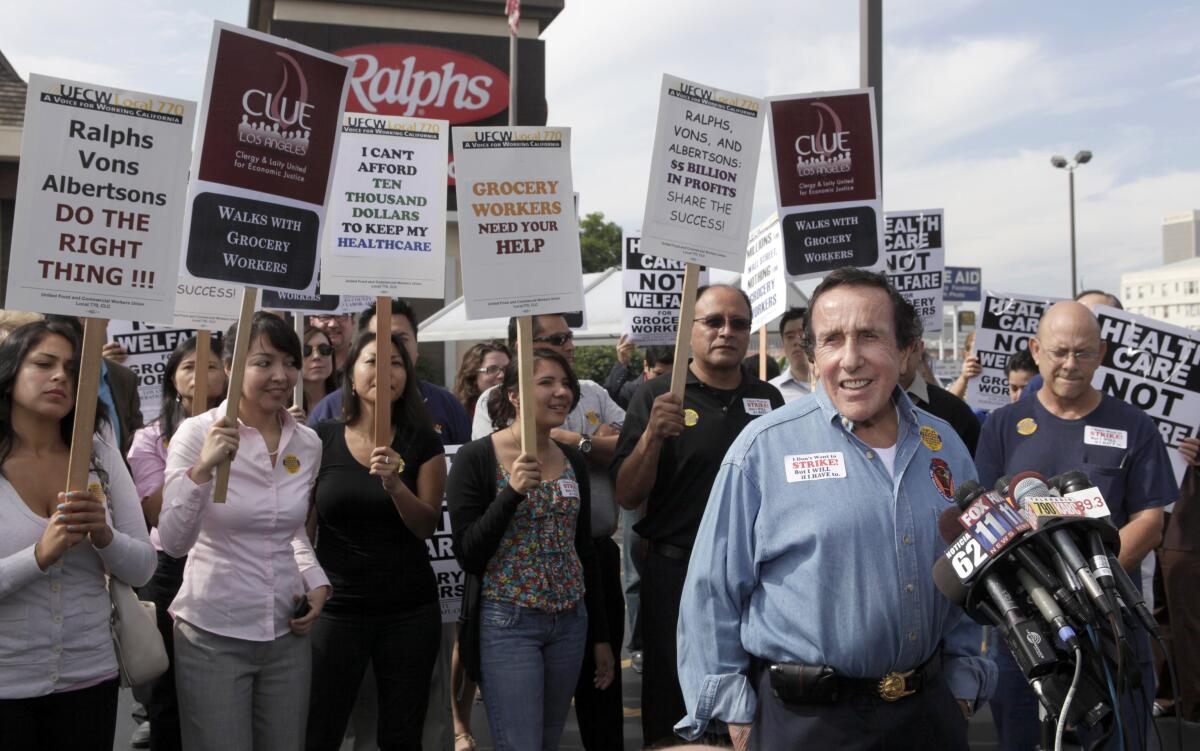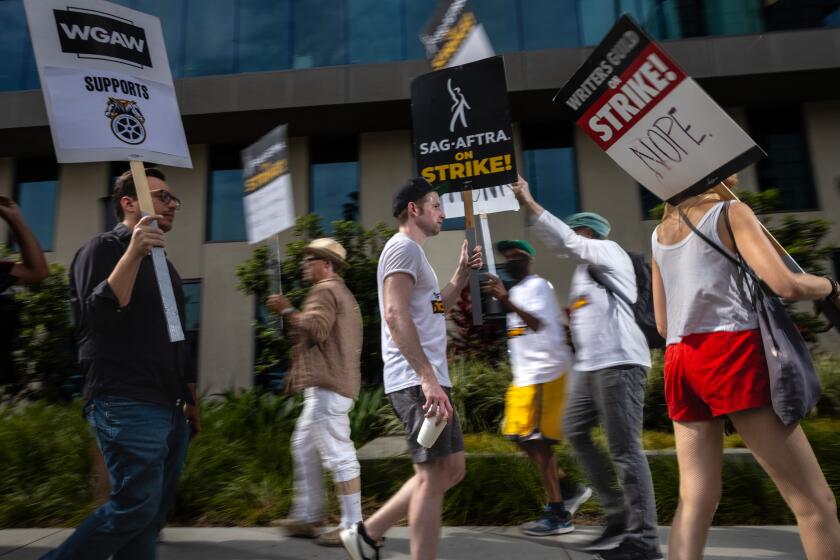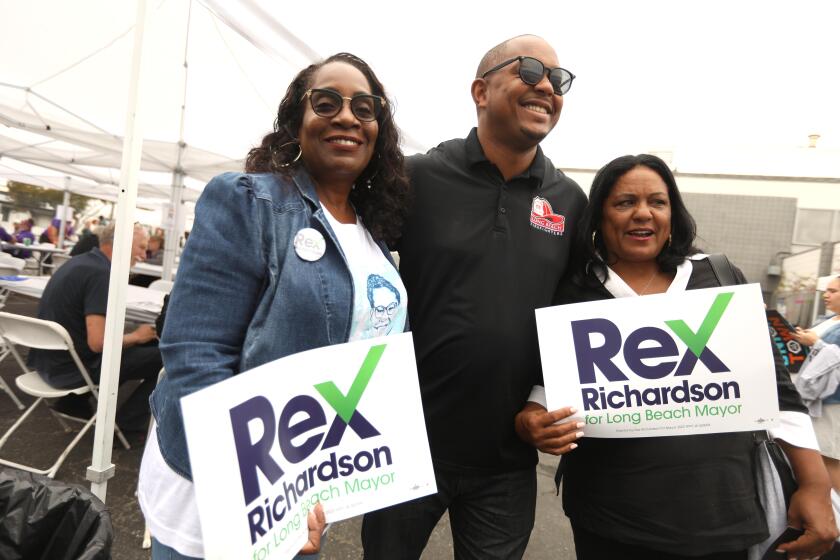Rick Icaza, Southern California grocery union leader, dies at 89

- Share via
Longtime Southern California labor leader Ricardo “Rick” Icaza, who gained a reputation as a tough negotiator during the grocery union’s periodic showdowns with the region’s supermarket chains, has died. He was 89.
Icaza was a member of United Food and Commercial Workers Local 770 for 64 years, joining when he was bagging groceries at Ralphs as he attended high school, then studied business at UCLA. He climbed his way to the top of the union, working well past the usual retirement age on behalf of union members in one of the country’s most competitive and evolving grocery markets.
“His vision as a leader helped put our Union at the forefront of the Labor movement in California and beyond,” the union wrote on social media. “He mentored and developed the great leadership we are fortunate to have today, and emphasized the importance of organizing new Union members and developing strong member leaders.”
Born in Los Angeles during the Great Depression to Mexican immigrants, Icaza was the son of a journalist and a garment district worker, who had emigrated from Mexico in the 1920s. After graduating from UCLA with a bachelor’s degree in business in 1956, Icaza joined UFCW Local 770 as a researcher and later spent 36 years as its president.
The best known episode in Icaza’s career was the 2003-04 California grocery workers’ strike, which lasted from October 2003 through February 2004, making it the longest supermarket strike in UFCW history.
The grocery giants looked toward worker concessions to stay competitive as Walmart began moving aggressively into California. The hard line caught union leaders off guard and contract negotiations, overseen by a federal mediator, stalled.
The hotel strike is hitting consumers harder than any other during Los Angeles’ labor summer, bringing complaints, a disrupted wedding and violence.
In October 2003, UFCW workers walked off the job at the Vons and Pavilions chains in Southern and Central California. Then Ralphs and Albertsons chains locked out their union workers in solidarity.
More than 850 stores and 70,000 unionized grocery store workers were covered by the expired contracts, and 59,000 were on strike or locked out. Workers picketed in front of markets and urged shoppers to take their business to chains that weren’t on strike, such as Costco and Trader Joe’s, as well as small and ethnic markets. The grocery chains shortened their hours and told Wall Street they were losing business, eventually totaling more than $1.5 billion in lost sales.
Icaza was leading UFCW Local 770 negotiations alongside representatives of six other locals, looking to preserve some of the dwindling middle-class jobs in Southern California.
“There was a fear that the grocery chains were going to take a hard line on the next contract,” said Nelson Lichtenstein, a research professor and director of the Center for the Study of Work, Labor and Democracy at UC Santa Barbara.
As the strike and lockout dragged on for 4½ months, some workers began to grumble about the union leaders’ strategy and Icaza’s salary ($273,404 in 2002), which resembled that of a corporate boss. (The union at the time pointed to the $1.26 million in salary and bonus earned in 2002 by Steven A. Burd, chairman of Safeway Inc., parent of Vons and Pavilions.)
As the strike stretched into its fourth month, Icaza, who was 70 then, told The Times: “I know my members are suffering.... It’s the most tragic thing that I’ve ever experienced. There are nights when I don’t go to sleep.”
Los Angeles is sitting at the vanguard of two trends: increasingly expensive housing and an increasing amount of cross-union solidarity.
“I just don’t want to have that legacy of being the one that destroyed the very thing it’s taken us 60 years to achieve,” he said.
The strike and lockout ended with a contract that created a controversial two-tiered labor system with less generous wages and benefits for new workers. It was widely viewed as a win for the supermarket giants, which bolstered one another during the labor action by sharing profits, an arrangement later struck down in court as a violation of antitrust law.
In 2006, Ralphs agreed to pay $70 million in fines and restitution, most going to workers, for illegally rehiring locked-out union members using fake names and Social Security numbers in the strike.
It was Icaza who pushed for more than the $40 million that Ralphs initially proposed, said Kathy Finn, a former director of bargaining and current president of UFCW Local 770.
“It was a huge risk,” Finn said. “I was getting a lot of calls from people like, ‘Can you convince him?’ He’s got to compromise because everyone else wants to take the 40. And he said, No. And then we ended up getting the $70 million.”
Labor leader and civil rights activist Yvonne Wheeler succeeds Ron Herrera, who stepped down from the Fed in October after his involvement in a racist recording.
In subsequent contract negotiations, the lower wage tier was eliminated and benefits were improved.
Icaza strove for inclusion both within the union and in conversations with his family. His daughter Desiree Kellogg, who now serves as a deputy attorney general with the California attorney general’s office, credits her father as a direct influence for her current work.
“What I really recall about my father is that he really valued education achievement, not success, and wanted to find the best in people. And really tried to nurture their talent,” said Kellogg, who was one of a handful of female graduates from Stanford Law School in 1986.
Finn credits the late president for elevating gender equity in the union.
“At a time when people were not putting women in leadership positions, he put many women in positions of director and other leadership roles at Local 770,” Finn said. She also recalled Icaza sending out memos within the union to support LGBTQ+ staff members.
“He didn’t look down at people. He was a very humble man. He just had a focus and the union was his life. That was his life, his family,” daughter Michelle Icaza said. From marching alongside farmworkers with Cesar Chavez in the 1980s to overseeing the integration of the cannabis industry into the union in the 2010s, the union credits Icaza with overseeing decades of change within labor in California.
Icaza also served as president of the Los Angeles County Federation of Labor, a trustee of the California State University system and a vice president of the Labor Council for Latin American Advancement. A real estate investor, he grew rich buying and selling residential and commercial properties.
Icaza was a romantic. According to his daughters, he wrote love letters to his future wife, Adele Salido, who had been hospitalized with tuberculosis in 1958. The two married in June 1960.
An international traveler and avid weekend beach volleyball player, he was also known for his stylish bow ties and vintage watch collection. Involved in the Democratic Party, Icaza frequently spoke out about issues related to immigration and Latino voting power. He took his daughters and grandchildren to the inauguration of President Obama.
Working for the union late into life, Icaza was diagnosed in 2017 with Parkinson’s disease. He retired later that year. Icaza died July 3.
Icaza is survived by his wife, Carmen Adela Icaza; daughters Desiree Kellogg, Michelle Icaza and Denise Icaza; and four grandchildren.
More to Read
Inside the business of entertainment
The Wide Shot brings you news, analysis and insights on everything from streaming wars to production — and what it all means for the future.
You may occasionally receive promotional content from the Los Angeles Times.














